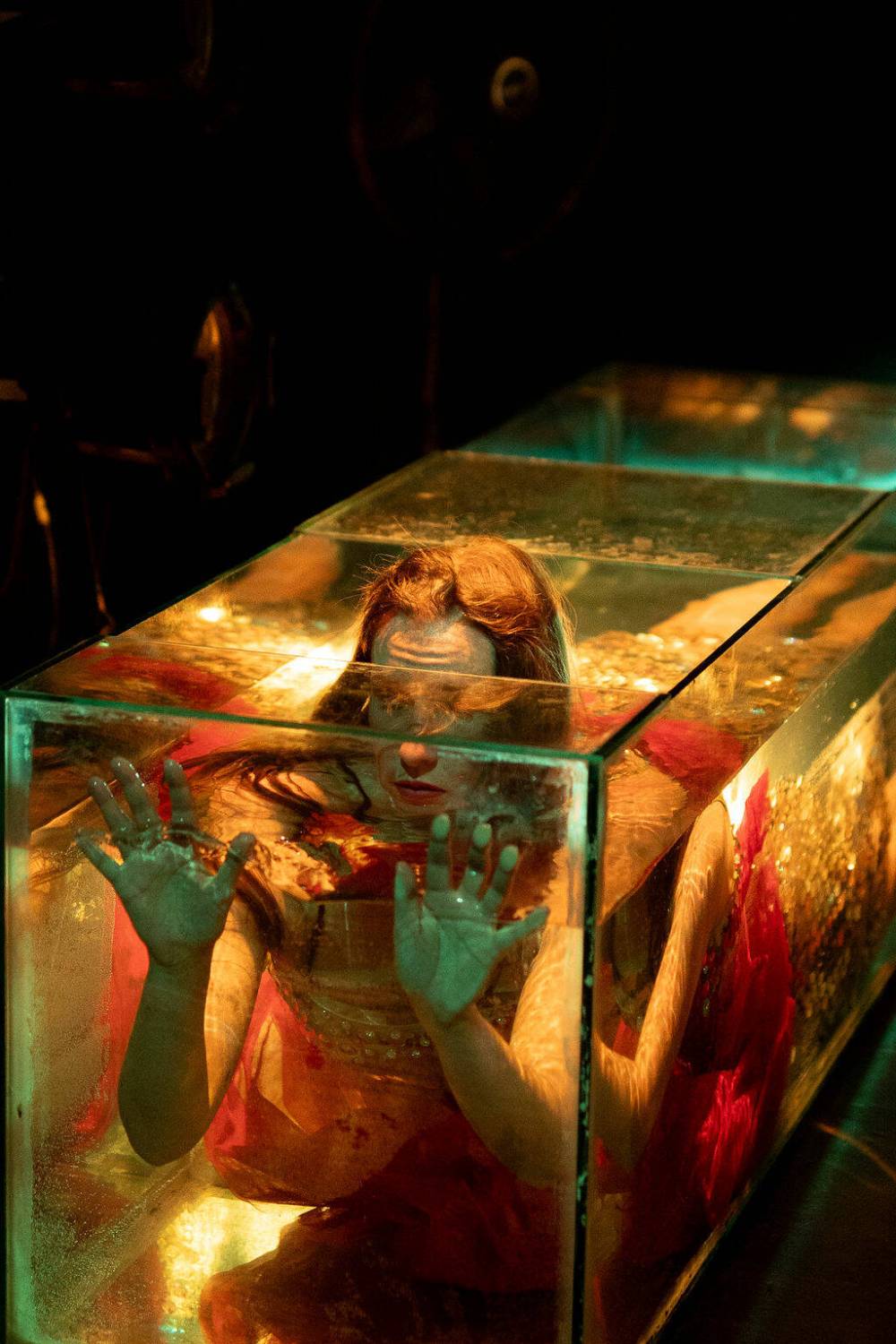Before Stéphanie Morin-Robert enters the picture, the audience members at Soft Spot are guests in a basement, bordered by a wall of blinds and coloured by projection to become the faux-wooden panelling of a rec room.
When Morin-Robert arrives, she is not herself, but an elderly man in a suit flecked by gold – joyous, celebratory and celebrated. We are guests at his birthday party.
As he makes his processional, the grandfather finds goodie bags, unwrapping and revelling in them to his heart’s content. The affectionately nicknamed Pépère drinks vino, munches a cupcake and turns a gifted camcorder on himself, sending Morin-Robert’s (Blindside, The Merkin Sisters) latest experiment in autobiographical exploration through the distorting filter of traditionally nostalgic media.

Soft Spot foregrounds broad comedic traditions but is structurally subtle and poetic.
The VHS record of family drama is incomplete, self-edited as a means of protection over time. A baby’s first steps may be transferred from video cassette to digital file, but their stumbles are recalled only by mostly private scars, often protected by a shield of humour.
Soft Spot, which opened Théâtre Cercle Molière’s 99th season on Wednesday, finds the Winnipeg-based francophone playwright boldly and fiercely telling one story of her life to the world after telling versions of it to herself for several decades.
A gifted comedian — imagine Don Rickles with the barrel of his insult gun trained at the temple of his own faltering body — Morin-Robert uses every tool at her disposal to workshop a breakthrough performance of obscure, transformative grace.
As Pépère entertains his guests with relentless energy — singing karaoke while never breaking eye contact — Morin-Robert plays herself, telling the story of the birth of her child, which for the artist coincided with a deepened understanding of her own multi-layered childhood.
As that story unfolds, Morin-Robert spares no details describing the bodily changes associated with pregnancy. Those who understand nod, acknowledging that the actor, by virtue of audience presence and biological reality, is not alone.
Who among us, she asks, has never wet themselves in a car trapped in traffic?
While Morin-Robert’s production foregrounds broad comedic traditions, it is structurally subtle and poetic, with the actor peeling off layer after layer of armour until she — and Pépère — stand in stark nudity, reclaiming the autonomy of the body while reimagining the misogynistic framework that defines what is and what isn’t grotesque, what is forgivable and what is forgotten, what is displayed on the mantel and what is filed away in the archive of traumatic memory.
(This show, marketed to audiences 16 years or older, features a content warning about female reproduction, sexual abuse and cancer, along with a pre-show explanation by Théâtre Cercle Molière’s artistic director Geneviève Pelletier that it is all right to leave if the subject matter becomes too heavy.)
Each time Morin-Robert’s own story delves into “difficult” territory, the actor magically finds a pair of Pépère’s glasses and a Groucho Marx moustache, recognizing that difficult stories sometimes require humorous punctuation before progressing past pain.
Over time, by design, the brilliant puppetry reveals itself as a crutch, and Morin-Robert asserts her skill as a choreographed dramatist.
Once she reclaims the narrative, freeing herself of the labour required of the “funny woman,” what she says — with her words, with her motion, with her own comfort in uncomfortable territory — is largely interpretive and uncompromising.
When she immerses her body in water, she emerges, refusing to sink. As the shag carpet inflates and undulates, she rides the crest of the wave. After the basement floods, it is Morin-Robert who is still standing.

Ben Waldman
Reporter
Ben Waldman is a National Newspaper Award-nominated reporter on the Arts & Life desk at the Free Press. Born and raised in Winnipeg, Ben completed three internships with the Free Press while earning his degree at Ryerson University’s (now Toronto Metropolitan University’s) School of Journalism before joining the newsroom full-time in 2019. Read more about Ben.
Every piece of reporting Ben produces is reviewed by an editing team before it is posted online or published in print — part of the Free Press‘s tradition, since 1872, of producing reliable independent journalism. Read more about Free Press’s history and mandate, and learn how our newsroom operates.
Our newsroom depends on a growing audience of readers to power our journalism. If you are not a paid reader, please consider becoming a subscriber.
Our newsroom depends on its audience of readers to power our journalism. Thank you for your support.


